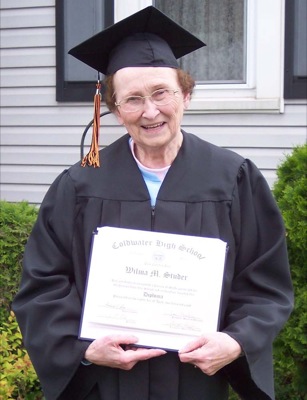Friday, May 23rd, 2008
Graduating a golden Cavalier
By Shelley Grieshop

Submitted Photo
Wilma Wynk, 80, poses for pictures on Mother's Day after receiving her high school diploma. A recent amendment to former veterans' legislation now awards diplomas to women who had to quit school to help their families during war times. Wynk is wearing a graduation robe, which also was worn this year by her grandson, Jason Bergman, a member of the 2008 Versailles High School graduating class.
At 80, Wilma Wynk recalls with bitterness the day her father ended her education and made her a full-time farmhand.
"I was 16 and had just finished my sophomore year at Coldwater (High School)," says the Osgood resident.
It was 65 years ago and her three brothers, Ray, Edward and Paul Studer, were called to serve in World War II. It was a trying time for the family; her father desperately needed her to get a job as well as help milk cows, gather eggs, harvest wheat and husk corn.
Her hardworking hands were at times as dry as the dirt on their rural Coldwater farm, she remembers, but it was her heart that ached the most. She longed for the routine of school and her classmates. Later she felt cheated when graduation day came and went without her.
"I held this against my dad for years," Wynk says. "I really felt like I was missing something."
This year her family gave her the best Mother's Day gift ever, she says - her high school diploma. Thanks to Ohio House Bill 552, which went into effect last year, women who left high school to support their families or the war effort during World War II or the Korean or Vietnam conflicts, now can obtain their diplomas.
"I've been getting graduation cards," says Wynk, who was presented her diploma on May 9 by Coldwater schools Superintendent Rich Seas. "I feel like a high school senior. My oldest son asked me if I was going to get a job now."
The honorary diploma program was first adopted by legislators in 2006 for veterans of war and included posthumous awards, at a family's request. In March 2007, an amendment was passed to include women who supported the war at home.
An application must be obtained from a veterans service office, which then sends it on to the school district involved for approval by the board of education.
In a photo snapped by a family member on Mother's Day, Wynk clutches her leather-bound diploma while wearing her grandson's graduation robe. Her smile is genuine and hides the sorrow she's overcome during her lifetime.
When Wynk was 2, her mother died of pneumonia; earlier, her sister, Helen, had passed away. Her father soon remarried. As Wynk reached adulthood, she married Lester Bergman, who tragically suffered a massive heart attack at the age of 38.
With no husband, no job, no money and six young children ranging in age from 6 months to 10 years old, she was forced to obtain a driver's license and take in sewing to make ends meet.
Two years later, in May 1964, she married Lester Wynk - "her second Lester," as she often called him. His past life, too, was filled with grief. His first wife - coincidentally named Wilma - along with their three children and an unborn child were killed in a train crash not far from the family's home.
She quickly became mommy to Lester Wynk's only surviving child, a 2-year-old son who had been at home with his father the day of the accident. The couple later rounded out their family with an eighth child, daughter Janet (Kemper), who now resides in Crestline.
It was Kemper, a school treasurer in Richland County, who learned about the diploma program and got the ball rolling.
"When I heard this I thought, 'What a nice Mother's Day gift that would make for my mom,' " she says.
The gift was much more than a token award to Wynk, now a grandmother and great-grandmother. The pain from missed class reunions and the feeling "like I'm no good," all seemed to fade away, she says.
"I can't really describe it, but I know it has made me feel complete," she says. "This has really fulfilled my life."


